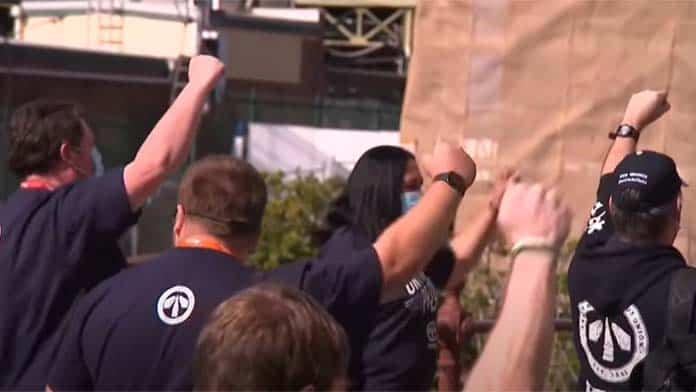Workers on Sydney’s train system took a four hour strike yesterday morning, bringing the rail system to a complete halt. It was the culmination of a month of industrial action, including bans on overtime, go slows and work to rule.
Further action is likely as Sydney’s COVID restrictions ease over the coming weeks.
Around 100 staff walked off the job together at 9am at Central station. Up to 700 workers from Sydney Trains and NSW Trains also joined a digital picket line and online meeting organised by the Rail Tram and Bus Union (RTBU).
The union has been bargaining for a new Enterprise Agreement for three months, but has been treated with contempt by management. “All we’ve got at the moment is junior managers sitting there reading a script”, the union’s NSW Secretary Alex Claassens told the meeting.
Management is looking to gut conditions, including clauses that protect workers against contracting out and privatisation of parts of the train service such as maintenance and cleaning.
Jonathan Parker, who works in infrastructure for Sydney Trains, added, “they’re trying to attack our rostering provisions, redundancy, termination on medical advice payments to name a few”. Sydney and NSW Trains are already increasing their use of outside contractors, threatening the jobs of permanent staff.
Another key issue is safety and staffing on the 55 New Intercity Fleet (NIF) trains, which will carry passengers between Sydney and the Central Coast, Newcastle, Wollongong and the Blue Mountains. The government wants drivers to use new CCTV technology to monitor boarding at stations, rather than guards checking physically.
“The safest way [to run the trains] is with a guard and station staff, that allows drivers to focus on their main role,” Dan Leece, President of the union’s locomotive division and an intercity train driver, told the meeting.
The government sees the new trains as “the transition to driver only operations” across the rail system, he added, and a way to cut jobs. The union’s proposed staffing arrangement, “means employment for all our members and also that the public are safe as well”.
The new trains were meant to be operating two years ago but a union ban has seen this continually delayed. As Dan Leece told the meeting the new fleet, “is currently in the sheds and it can rust to the rails until we get our way”.
The strike united workers across the rail industry, from cleaners and train drivers, to station staff and maintenance workers. This included ASU and Professionals Australia members at Sydney and NSW Trains joining the strike action.
The union is also demanding that new hygiene and cleaning requirements introduced in response to COVID continue, and an extra 1 per cent in superannuation payments.
Management has offered just a 0.3 per cent pay rise next year, failing to explain why this is so far below the NSW government’s public sector wage cap of 1.5 per cent, as well as 2.5 per cent in following years. Last year public sector workers across the state, including trains staff, received the same insulting 0.3 per cent increase as a result of the NSW government’s effort to freeze wages during COVID.
ACTU President Michele O’Neil pointed out that train staff are among the essential workers who have kept working all through the COVID crisis who, “had to keep turning up and do an essential job, and take risks with your and your family’s health to keep essential services open.”
Yet in return workers are now being treated with contempt by trains management and the state government.
“We’re going to let them know we’re not going to stand for that”, Alex Claassens told the meeting, “we’re not going to stand by and watch this government disrespect our workforce, compromise safety on our network, cut out cleaners’ jobs and bring in contractors.”
“We’re going to fight them every step of the way.”
It was only three years ago that Sydney train drivers were banned from taking strike action in a “Fair Work Commission” hearing under anti-strike laws, because of the potential impact on the NSW economy from transport disruption.
The union pushed ahead with yesterday’s stopwork despite the difficulty of taking action under lockdown conditions in Sydney. Union members voted “to support taking whatever future action is necessary”, including further strikes as restrictions ease.
Escalating the level of strike action, including pushing ahead with the kind of 24-hour stoppages the union backed away from after 2018’s Fair Work ban, will be necessary to win over safety, staffing and workers’ conditions.
By James Supple






